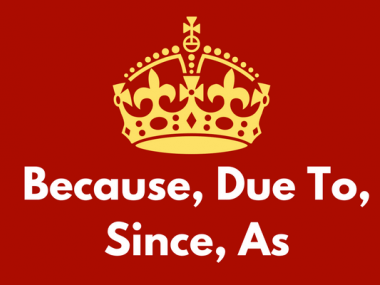Can You Start a Sentence with “Just Because”?
It’s tricky to pick apart the grammar of a sentence such as Just because you’re correct doesn’t mean you’re not annoying. Guest writer Neal Whitman explains why such sentences work and what they really mean.

In general, the peeve cards in my Peeve Wars game deal with commonly known problems such as dangling modifiers and misused apostrophes, but one card isn’t about mistakes: It’s the Grammar Snob card. This card says, Just because you’re correct doesn’t mean you’re not annoying. Did you realize that this card, too, has some, shall we say, unusual grammar in it?
I’ll repeat the sentence on the Grammar Snob card: Just because you’re correct doesn’t mean you’re not annoying. If you try to analyze this sentence by breaking it down into its subject and predicate, you’ll see that it doesn’t have a typical subject-predicate structure. The predicate is the verb phrase doesn’t mean you’re not annoying. It’s when we try to identify the subject that things get weird.
Can Phrases and Clauses Be Subjects?
Although not all linguists agree, most take the subject to be Just because you’re correct. This is unusual, though, because Just because you’re correct is not a noun phrase like a typical subject; it’s an entire clause.
Of course, some clauses do act like noun phrases: We call them noun clauses. However, noun clauses begin with the subordinating conjunction that, or with a question word such as who, what, where, when, why, or how. For example, in the sentence How you do it doesn’t matter, How you do it is a noun clause acting as the subject of the sentence.
Noun clauses typically don’t begin with the subordinating conjunction because, or with just because. If we wanted to rephrase the sentence on the card with a noun clause as a subject, we could do it like this: That you’re correct doesn’t mean you’re not annoying.
Buy Now

Let’s Try It With A Simpler Sentence
Then there’s the unusual meaning of these just because sentences. Take a sentence such as Just because Aardvark saw a black cat, he was afraid to go to Squiggly’s birthday party. It means that Aardvark was afraid to go to Squiggly’s birthday party for one reason: that he saw a black cat.
Now compare this to Just because you’re correct doesn’t mean you’re not annoying. Actually, let’s use a simpler example, without so many negatives. How about Just because you’re correct doesn’t mean I’m wrong? And to make sure we’re comparing apples to apples, let’s use a version of this sentence that has a clearly identifiable subject: Just because you’re correct, that doesn’t mean I’m wrong.
If this sentence were like the one about Aardvark and the black cat, it would be saying that there’s just one reason for something not meaning I’m wrong, and that one reason is that you’re right. I don’t know about you, but I can hardly understand that meaning, even after choosing a simplified example, and writing and re-writing that paraphrase. It’s nothing like the easily understood meaning about Aardvark’s superstition and Squiggly’s party.
Just Because Denies an Inference
But any native speaker of English can easily understand the meaning of Just because you’re right, that doesn’t mean I’m wrong, and Just because you’re right, that doesn’t mean you’re not annoying. What these sentences are doing is denying an inference that someone might mistakenly be making; specifically, If I’m right, then you’re wrong, and If I’m right, then I’m not annoying. The same goes for the more common versions without a clear subject: Just because you’re correct doesn’t mean I’m wrong and Just because you’re correct doesn’t mean you’re not annoying.
Just Because Sentences Have Been Around for More Than 100 Years
Sentences of the form Just because X doesn’t mean Y are everywhere, and according to one recent paper, they really started to become common after 1950. (1) However, Otto Jespersen’s work on English grammar, which was published between 1909 and 1949, has examples from the late 19th and early 20th centuries. You can read these examples in the Merriam-Webster Dictionary of English Usage, which cites Jespersen in its entry on just because. The first example the authors give is a just because X doesn’t mean Y example from 1913, in a story by Booth Tarkington: Just because I’m here now doesn’t mean I didn’t go, does it? Jespersen’s earlier examples show that the verb isn’t always doesn’t mean; one from 1897 is, Just because a fellow calls on a girl is no sign that she likes him. (2)
Recent Examples of Just Because Sentences
In a 2001 conference paper, (3) Emily Bender and Andreas Kathol go even further, showing that this just because sentences are used not just to deny inferences, but to deny various other kinds of connections that someone might imagine, such as that X is evidence of Y, or that X justifies Y, or even that X prevents Y. Here are a few examples that have appeared on the Internet within the past three years:
- Just because someone desire[s] something to exist, isn’t evidence that it doesn’t exist. [Source]
- Just because gasoline prices are up doesn’t justify dipping into the Strategic Petroleum Reserve. [Source]
- Just because something is lawful, doesn’t prevent it being controversial. [Source]
Bender and Kathol even show that the predicate doesn’t even have to be negative, as long as the utterance as a whole is negated. You can even do this implicitly, in the form of a sarcastic statement or a rhetorical question, like this one that Bender and Kathol found:
Just because a guy has bleached hair, winter tan, speaks slowly and is pleasant to the point of being vacuous … does that mean he’s a surfer?
Just Because It’s an Idiom Doesn’t Mean It’s Wrong
All in all, these connection-denying just because sentences are best considered a kind of idiom. You won’t get their meaning by trying to assemble it from its component pieces the way you do with typical sentences. You just have to recognize the pattern and install it in your grammar with its own special rule … in much the same way as you did when you learned how to understand non-canonical sentences such as What a great friend! Or, I might add, the way you had to learn the meaning of I could care less in order to understand what people meant by it.
This raises a question: Why has could care less attracted so much disapproval that it is now one of the peeve cards in Peeve Wars, while just because X doesn’t mean Y has mostly slipped by unnoticed? It’s not clear. The lesson to take is that just because something doesn’t follow the mainstream rules of English grammar doesn’t automatically make it nonstandard.
This podcast was written by Neal Whitman, who has a PhD in Linguistics, blogs at LiteralMinded.Wordpress.com and is a regular columnist for the online resource Visual Thesaurus.
References
-
Hilpert, Martin. 2007. “Just because it’s new doesn’t mean people will notice it.” English Today 23.29-33.
-
“Because.” Merriam-Webster Dictionary of English Usage. 1994. 171.
-
Bender, Emily M. and Andreas Kathol. 2001. “Constructional effects of just because … doesn’t mean …” Proceedings of the 27th Annual Meeting of the Berkeley Linguistic Society. 13-25.





